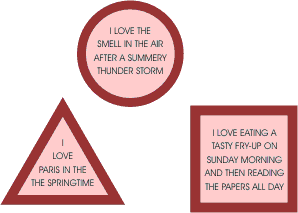i cdnuolt blveiee taht I cluod aulaclty uesdnatnrd waht I was rdanieg. The phaonmneal pweor of the hmuan mnid, aoccdrnig to a rscheearch at Cmabrigde Uinervtisy, it dseno't mtaetr in waht oerdr the ltteres in a wrod are, the olny iproamtnt tihng! is tah t the frsit and lsat ltteer be in the rghit pclae. The rset can be a taotl mses and you can sitll raed it whotuit a pboerlm. Tihs is bcuseae the huamn mnid deos not raed ervey lteter by istlef, but the wrod as a wlohe. Azanmig huh? yaeh and I awlyas tghuhot slpeling was ipmorantt! if you can raed tihs forwrad it.
If I’m not mistaken, you had no trouble reading it. Now take a look at a second item and find the sentence with the error:
This one is tricky. It may take you several minutes to find the answer, which I’ll give at the end of the post here.
Together these items point out the capability of the human brain to find patterns and sense in any jumble of words. You can rest assured that even if you don’t write with the fluency of Hemingway, your readers will still be able to follow along, albeit with a certain amount of effort at times, especially if you jumble word order as well as letters within words.
The second item also demonstrates that we see what we expect to see and easily overlook things that don’t fit. It reminds us that readers derive their own meanings from stories, and the meanings they derive aren’t always the ones that we intend.
Put the writer's quest for perfection next to this evidence that readers will make some sense of anything, based on their own sense of perfection, then throw away your shackles of doubt and fear. Write your stories with playful abandon, the best you are able, and rest assured that readers will each find the meaning that matters most to them.
In case you haven’t found it, the error lies in the triangle, with the sentence, “I love Paris in the the springtime.” The line break causes your eye to skip right over that second the.
Write on,
Sharon Lippincott, aka Ritergal


4 comments :
Hi, Sharon
I'm guessing that the 'presumably sew on up' was intentional.
Miss you at the Lifestory site.
Haz
Hi Hazel,
You are sew right, about the intentional typo. This is an example of my warped sense of humor, and would be most obvious to those who know me well. 8-)
BTW, for those who may feel a bit baffled, this comment actually refers to the previous post about perfection.
Sharon
I am sew glad to again have more of your stories to read. You thread together thoughts so well. I think I have missed the perfection gene as I dash off yards of words to get them out of my thoughts and woven into something resembling a quilt. Often even I don't know where the words are threading until I finish seaming it all together. At times the garments are a little loose but they usually feel comfy and wear well with age.
Hey, Sunny Girl, you say "Often even I don't know where the words are threading until I finish seaming it all together."
That's one of the beauties of writing for self-discovery. We may surprise ourselves with answers to questions we didn't even know we had. I blogged about this in Writing Changes the Writer. You might want to take a look again.
Tell us more about those comfy garments that wear well with age.
Thanks for posting and write on,
Sharon
Post a Comment